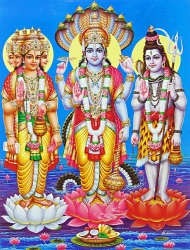Is Hinduism Polytheistic?

Hinduism has plenty of deities, it would appear to a less knowledgeable that Hindus are Polytheistic. Let's Look at the different sects of Hinduism and How they view God.
Sects of Hinduism:
- Shaiva: Shaivas Consider Shiva to be the Supreme Lord, and other deities to be secondary
- Vaishnava: Vaishnavas consider Vishnu to be the Supreme reality and other deities to be his devotees or secondary.
- Shaakta: Shaaktas consider Feminine goddesses like Durga, Kali, Vaishnovi, Laxmi to be the supreme reality, depending on the subsect one of the forms is considered supreme.
Conclusion: Different sect considers different Deity to be the ultimate, Though each sect reveres every other deity, they consider secondary deities to be the creation of the ultimate for the sake of maintenance of the world.
Let's Look into what the various Philosophical Schools of Hinduism think of God.
Philosophical Schools of Hinduism:
- Advaita: There is no separation between God and Creation, God which is consciousness assumes multiple individualities as in a fantasy. Everything is essence is consciousness.
- Dvaita: There is clear distinction between God and Creation. There is One God though many groups call him by many names.
- Vishishtadvaita: It justifies both the above philosophies, until one realizes oneness with God it is valid to see God as separate from self.
Conclusion: According to Advaita- God has become everything. According to Dvaita there is one God, though different groups call him differently.
Now Let's look into what the Primary Scriptures say about God. These scriptures are used by all the sects and philosophical schools above mentioned.
God in Bhagavad Gita:
I'm the source of everything; from Me all creation emerges. With this realization the wise, awestricken, adore Me.-Bhagavad Gita10:8
I'm the self in the heart of all creatures: I'm their origin, existence and finality. -Bhagavad Gita10:20
[Here Krishna Talks of Oneness of God and Creation.]
Whatever embodiment (a god incarnate , a saint, or a deity) a devotee strives faithfully to worship, it is I who make his devotion unflinching. -Bhagavad Gita 7:21
In whatever way people are devoted to me, in that measure I manifest Myself to them. All men, in every manner(of seeking Me), pursue a path to Me -Bhagavad Gita 4:11
[There is nothing but Me, No matter who you worship it reaches Me, according to your nature, I help you grow spiritually]
God in Upanishads:
"Ekam Sat Viprah Bahuda Vadanti"- Rigveda (Truth is one, though sages call it by many names)
[Truth is one though different seekers call it by different names]
"Prajnanam Brahma" Consciousness is God-(Aitareya Upanishad 3.3)
"Ayam ātmā brahma" - This Self (Atman) is Brahman" (Mandukya Upanishad 1.2 of the Atharva Veda)
[Self in reality is the God]
"Tat tvam asi"- Thou art That" (Chandogya Upanishad 6.8.7 of the Sama Veda)
[We are that God]
"Aham brahmāsmi" I am Brahman", (Brhadaranyaka Upanishad 1.4.10 of the Yajur Veda)
[In finality, we are God]
"Ekam evadvitiyam brahma" - Brahman is one, without a second - Chāndogya Upaniṣad
[Though world appears to be full of beings, when one does not accept the world appearance as reality, he will gradually realize there is nothing but God, separation and individuality are just notions that Consciousness entertains as in a play (Lila)]
God in Tripura Rahasya:
"Infinite has no image, Yet there is no image which is not him"- Tripura Rahasya
"God is the canvas (base) on which the creation is just the play( of colors)" ~Tripura Rahasya
[She is the color, brush, imagination too]
For that supreme Good one, my mother, is ever pure and clear, more extensive than space and subtler than the subtlest; she is omniscient, yet of limited knowledge; she does all works, yet remains inactive; she holds up all, herself being unsupported; all depend on her, yet she is independent; all forms are hers, but she is formless; all belong to her, but she is unattached; though illuminating all, she is not known to anyone under any circumstances; she is bliss, yet not blissful; she has no father nor mother; innumerable are her daughters, like me. - Section from Story of Princess HemaLekha
Just as the reflection of the city exists in the mirror because the city exists, the whole world exists because there is consciousness
Final Conclusion: Though There is a pantheon of deities, all of them are considered either different expressions of the same ultimate reality signifying a particular quality. Or as the parts of the Ultimate which performs a particular task for the existence of this world.